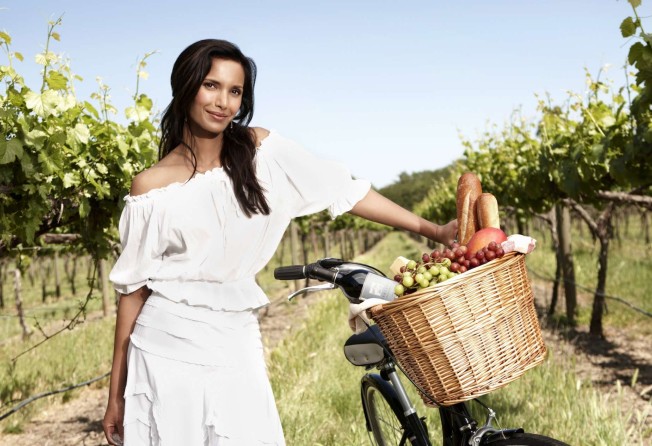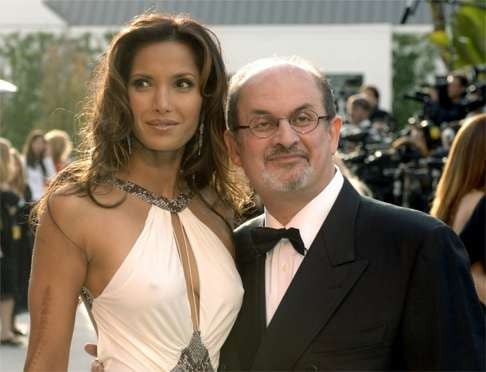
Book review: Love, Loss and What We Ate by Padma Lakshmi
Model, TV host and cookbook author’s memoir is a collection of heartfelt memories, astute observations, albeit with a jumbled timeline


Love , Loss and What We Ate
by Padma Lakshmi
Ecco

At the beginning of her memoir Love, Loss & What We Ate, it’s 2007 and Padma Lakshmi has left the gracious brownstone she shared with husband Salman Rushdie and shuttered herself in New York’s Surrey Hotel – which she dubs the Sorry Hotel.
And with good reason. She’s just separated from her Pulitzer Prize-winning much, much older mate, who she began dating during his infamous fatwa period, and then married. In her depressing makeshift home, she is surrounded by towers of unpacked boxes, boxes that contain remnants of her former life – trinkets she collected during her years as an international model, mementos from travels as the wife of one of the world’s most lauded writers, and exactly half the wedding photos.
She has also just gone through a series of excruciating operations for her endometriosis, a condition that has left tenacious scar tissue along her reproductive tract and around her organs, causing her to wince at the painful stitches every time she moves.
Weak, miserable, unsure of her decision to leave Rushdie, she nearly falls on top of a box, causing dozens of kumquats, a gift from her mother in Los Angeles, to tumble out. They scatter everywhere on the kitchenette’s tiles. “When the avalanche stopped, my gaze focused on the bright, beautiful fruit, the orbs glowing orange against the dull backdrop of everything else. The man I left was like that: He could illuminate any room, no matter how dim.”
There are myriad reasons for why Lakshmi – model, cookbook author, television host, famous literary wife, and most recently, paternity scandal (for some time Lakshmi did not know if her young daughter came from her relationship with venture capitalist Adam Dell or with billionaire Teddy Forstmann) – should write a memoir, and why, in turn, the international reading public would gobble it up.

And then, of course, there’s Rushdie – Lakshmi’s mate for eight years (three of those years as his spouse). Elevated to the status of literary greatness with his Pulitzer, Rushdie then reached a certain level of infamy when his fourth novel, The Satanic Verses (1998), earned him a death warrant from the Ayatollah Khomeini. Lakshmi entered his world when he was still surrounded by UK government-funded bodyguards and shuttled among luxurious safe houses all over the globe. More to the point, Lakshmi began a romantic relationship with Rushdie when – shhhhh! – he was still married to his third wife. And that’s just part of the drama of Lakshmi’s life lived large.
The author, an avid reader, made it clear from the start, that she aspired something bigger: a literary memoir. And yet, to write a book of any merit, she would need to accomplish two things: First, she would have to offer up the beyond-the-surface details and secrets of her relationships and struggles. Second, she would actually have to be able to write.
It’s buoying to report that Love, Loss & What We Ate is a vivid and sweeping book, with Lakshmi as its intelligent, observant and earthy narrator. And, yes, she dishes: she writes of her first meeting with Rushdie, how while married to Elizabeth West, he caught sight of a glamour shot of Lakshmi in an Italian magazine and cut it out, and pursued her for months by phone. When they finally met despite her protests:
Lakshmi: I can’t do this, you’re married.
Rushdie: It’s only lunch.
They ended up spending 11 hours together, many of those in bed at his five-star hotel. “I got dressed and skulked out of the Mark, feeling like a hussy,” she says, recounting her walk of shame home.
But more tellingly, readers hear about almost comically imbalanced relationship that ensues: famous 23-years-older husband with a superstar career marries sexy 29-year-old model, cookbook author and occasional actress with her own searing ambitions.
As Lakshmi tells it, Rushdie expected his wife to drop everything and accompany him to literary events around the globe, never truly appreciating the fact that she desperately wanted to forge her own way in the world. Add to that Rushdie’s demands on her sexually. After dinner out for their third anniversary, Lakshmi rushes home to her heating pad and bed, hoping to alleviate a then-undiagnosed and excruciating pain that has her doubled over. Rushdie hisses at her, angry and wounded, when she refuses his physical advances. So bad is the pain that night that she ends up calling an ambulance and rushing to the hospital.
Lakshmi’s narrative is equally fascinating when she leads us back to her home village, to which she, at age seven, is sent to live with grandparents, after a distant relative in New York sexually molests her. The author’s memories there revolve around kindly and wise grandparents, cousins running wild in the village, the intriguing and exotic smells and tastes of the subcontinent, and delectable home-cooked meals. It is in the village where Lakshmi’s deep passion for food – and her cooking skills – first form.
Even after Lakshmi’s life with Salman comes to a close, her days are punctuated by romance, drama and many more great meals. In her late 30s, she enters an epic love affair with Forstmann, while at the same time dabbling in a relationship with Dell (who, as it’s finally determined, is the father of Lakshmi’s daughter, Krishna). When Forstmann dies of brain cancer he leaves Krishna a sizable fortune and Lakshmi, an Indian village girl who once spent most of her days barefoot among palm trees and sacred cows, holds on tight as her life turns upside down again.
It’s clear that the author did not write the book for the sake of a hefty advance – with Forstmann’s millions, she didn’t need to. But some part of her clearly needed to. Although uneven at times and with a strangely jumbled timeline, the narrative is a collection of heartfelt memories, astute observations and plain old good dish.
In the book’s acknowledgments, Lakshmi thanks Rushdie for “planting the seed” for the memoir and “handing her Rousseau”. What she hands back to us readers may not be Rousseau, but it’s a moveable feast – funny, poignant and delectable all at once.